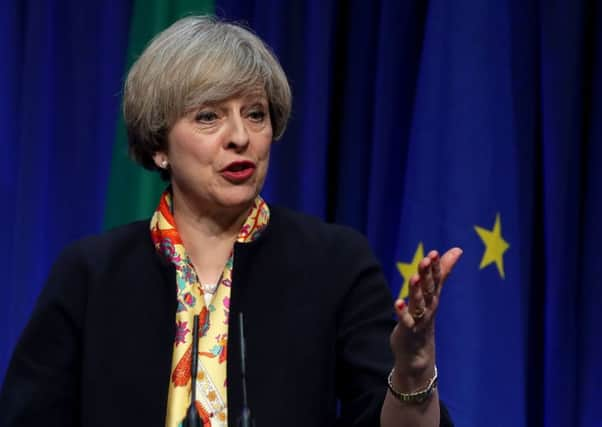Theresa May refuses to back down over Trump state visit


A petition calling on the government to revoke its offer to the US president gathered more than 1.4 million signatures as protests were held across the UK.
The Prime Minister was branded ‘Theresa the appeaser’ by one MP during bad-tempered exchanges in the House of Commons, with the opposition accusing Mrs May of lacking the courage to issue any stronger condemnation.
Advertisement
Hide AdAdvertisement
Hide AdThere was confusion yesterday over the scope of the ban on travel to the US by those born in seven predominantly Muslim countries.
Foreign Minister Boris Johnson told MPs he had secured an exemption for UK citizens with dual nationality, but US Embassy advice initially appeared to contradict him before it was changed yesterday afternoon.
The Prime Minister said she “disagrees” and “takes a different approach” following the US president’s signing of an executive order banning the resettlement of refugees from Syria, and temporarily banning travel by those born in or citizens of Iran, Iraq, Libya, Somalia, Sudan, Yemen and Syria.
At a press conference in Dublin following a meeting with the Irish Taoiseach Enda Kenny, a defiant Mrs May insisted the invitation would stand.
“The United States is a close ally of the United Kingdom. We work together across many areas of mutual interest and we have that special relationship between us,” she said.
“I have issued that invitation for a state visit for President Trump to the United Kingdom and that invitation stands.”
Mr Kenny said he would accept the traditional invitation to the White House on St Patrick’s Day.
However, he said he would raise his concerns with Mr Trump in person, in comments that will increase pressure on the Prime Minister to go further in her criticism.
Advertisement
Hide AdAdvertisement
Hide AdDowning Street did not comment on reports that Mrs May discussed the executive order with the president during a visit to Washington on Saturday, hours before it came into force.
The Foreign Secretary made a commons statement after getting assurances on the status of UK nationals in a series of phone calls with advisers to Mr Trump.
“The general principle is that all British passport holders remain welcome to travel to the US,” Mr Johnson told MPs, adding that the policy was “divisive and wrong”.
“We have received assurances from the US Embassy that this executive order will make no difference to any British passport holder, irrespective of their country of birth or whether they hold another passport,” he said.
Mr Johnson claimed the government’s “energetic action” had secured the exemption and accused the government’s critics of seeking “pointlessly to demonise” the US administration.
Shadow foreign secretary Emily Thornberry warned that thousands of people living in Britain who are nationals of the seven countries and have no dual citizenship could still be barred from travelling to the US.
Attacking the speed of the government’s response, she said: “This order was issued at 9:45pm on Friday UK time. It then took Number 10 until midnight on Saturday – fully 27 hours later – to say they would consider the impact on UK nationals.
“It then took the Prime Minister until Sunday morning to tell the Foreign Secretary to telephone the White House and it took him until midday on Sunday to call the travel ban divisive and wrong.
Advertisement
Hide AdAdvertisement
Hide Ad“That is 38 hours to have the courage to say what everyone else was saying on Friday night.”
In some of the strongest language in the debate, SNP MP Carol Monaghan said: “The Holocaust didn’t start with the gas chambers and only days after Holocaust Memorial Day, the parallels are clear.”
She insisted there should “not be a complicit acceptance” of the new travel rules in order to secure a trade deal with the US after Brexit.
Mr Johnson told Mrs Monaghan that the comparison “trivialises the Holocaust”.
Labour MP Mike Gapes made the “appeaser” jibe as he questioned why Mr Trump was being given the quickest invitation for a state visit in the history of US-UK relations.
Fellow Labour MP Dennis Skinner branded Mr Trump a “fascist”.
Mr Johnson said he found it “distasteful” that the “elected leader of a great democracy” was being compared to “1930s tyrants”.
Protesters gathered outside Downing Street and in cities across the UK to demand the invitation to the US president be revoked.
Advertisement
Hide AdAdvertisement
Hide AdThe largest Scottish protests were in Edinburgh and Glasgow where crowds swelled from around 5pm, and protests were also evident in Aberdeen and Dundee.
Placards and banners were held aloft in Glasgow as a crowd of about 500 people chanted “hope not fear, refugees are welcome here”.
The protests were organised by a variety of groups including Stand up to Racism.
Demonstrations continued in George Square after a three-hour rally in Buchanan Street, Glasgow.
In Edinburgh, large crowds marched from the North Bridge to the US Consulate in Regent Terrace.
Donald Trump defended the ban, tweeting yesterday: “There is nothing nice about searching for terrorists before they can enter our country. This was a big part of my campaign. Study the world!”
He added: “If the ban were announced with a one-week notice, the “bad” would rush into our country during that week. A lot of bad “dudes” out there!”
“This is about the safety of America.
“This is why the majority of Americans agree with the president.”
A White House spokesman told reporters last night: “These steps are frankly common sense steps to make sure we’re never looking at the rear-view mirror asking ‘we should have done something’.”